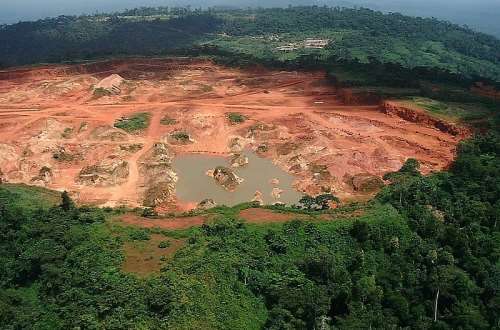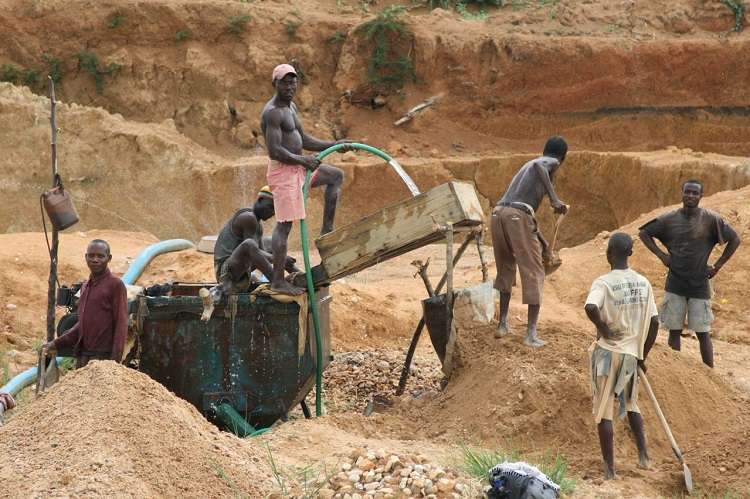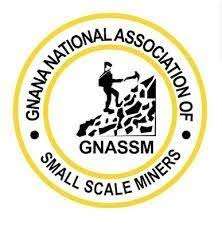Galamsey, the illegal small-scale mining operation prevalent in Ghana, poses a serious environmental and socio-economic threat.
Its damaging impact on water bodies, forest reserves, and agricultural land has raised significant concern, leading to discussions on how to best address the menace.
One of the more radical solutions proposed is for the government to impose a blanket ban on all forms of mining.
However, the economic implications of such a move must be carefully considered.
Accordingly, the Ghana National Association of Small-Scale Miners (GNASSM) has acknowledged that small-scale miners share the concerns raised by various CSOs, labor unions, religious bodies, and the general public regarding the pollution and destruction of forest reserves.
However, they argue that a blanket ban should be reconsidered due to its potential economic implications.
“The Ghana National Association of Small-Scale Miners have noticed how some sections of the media and some groups of Ghanaians are twisting the Press Statement by the Organized Labor which was released on the 1st of October 2024.
“The statement did not say anything about banning all forms of small-scale mining but rather the inaction of the government in dealing with the illegal mining activities (galamsey) hence their intended strike from 10 October 2024”.
Ghana National Association of Small-Scale Miners (GNASSM)
The Association further proposed and is taking specific steps to support the government in addressing the issue of illegal mining.
GNASSM urged the government to urgently deploy personnel to water bodies to curb ongoing pollution, pledging its full support in any form necessary.
Additionally, GNASSM recommended that the government reconsider granting permits to companies operating in forest reserves.

The Association stressed that permits should be revoked if these companies fail to comply with the conditions set forth.
Furthermore, GNASSM committed to deploying its task force to arrest illegal miners polluting water bodies, mining near highways, and fabricating dredgers.
The Association emphasized that illegal mining (galamsey) is a violation of the law, with sanctions clearly outlined under the Minerals and Mining Act 2006 (Act 703), as amended by Act 995.
It urged the government and its agencies to rigorously enforce these laws to curb the illegal activities.
GNASSM Urges Organized Labour to Reconsider Strike
Moreover, the Ghana National Association of Small-Scale Miners pleaded with Organized Labour to reconsider its decision to embark on a nationwide strike, as it would further strain Ghana’s already fragile economy.
GNASSM urged Organized Labour to lead discussions aimed at finding lasting and sustainable solutions to illegal mining—solutions that are not politically driven, but rather guided by technical and professional expertise.

“There should be a bipartisan approach to dealing with the illegal mining menace. Those who are politicking with the issue for their own selfish gain should know that it is not the solution issue but rather a path to our destruction as a people because when we don’t have water there is no life.
“Once again, we know the importance of the small-scale mining sector which contributes over 8.4 percent to GDP and 40 percent of our merchandised export”.
Ghana National Association of Small-Scale Miners (GNASSM)
GNASSM further argued that small-scale mining plays a crucial role in job creation, providing direct employment to an estimated 1 million people and indirectly supporting the livelihoods of 4 million more.
Additionally, the Association indicated that the sector supplies raw gold for value addition by local jewelers, creating downstream job opportunities that contribute to the broader economy.
GNASSM highlighted that unemployment is a security threat, and issues such as food and water shortages, as well as environmental destruction, also pose significant security risks.
Therefore, GNASSM stressed the need to find a balanced, win-win solution that addresses these concerns holistically rather than a blanket ban on mining.
The Association further expressed its belief that the growing interest from Ghanaians and the pressure on the government to take action have created a crucial opportunity to address illegal mining activities once and for all.
READ ALSO: Georgian Parliament Speaker Signs Anti-LGBTQ Bill























